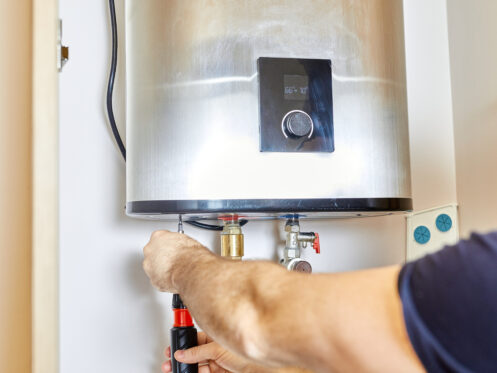If your Lincoln, NE home needs a new water heater, you’ll have two primary options. One is a storage-tank water heater, which is likely what your home already has. Storage tank water heaters serve approximately 97% of US homes, according to ENERGY STAR. Your other option is a tankless water heater. While less common, they offer some notable advantages over their storage tank counterparts. Here’s everything you need to know about them so that you can make an informed choice.
What Are Tankless Water Heaters?
A tankless water heater heats water on demand. Also known as demand-type or instantaneous water heaters, they operate at high temperatures to rapidly heat incoming tap water to 120 to 140 degrees Fahrenheit. Most tankless water heaters use natural gas burners to provide the necessary heat. However, some smaller and point-of-use tankless systems use electric heating elements.
How Does a Tankless Water Heater Work?
The water heating process in a tankless begins when you call for hot water somewhere in your home. When you turn on a faucet or appliance, water flows through your hot water supply lines. A flow sensor at the tankless heater’s water outlet detects that flow and activates the system. In an electric heater, that begins with the heating element turning on. In a gas-fired model, it starts with a ventilation fan activating and the unit’s burners igniting.
As the heating element or burner heats up, it warms a heat exchanger. It works like the radiator in your car but in reverse. In this case, the hot heat exchanger transfers its heat to water running through pipes passing through it. From there, a mixing valve measures the water’s temperature and adds cold tap water as needed. That’s how a tankless accounts for varying incoming water temperatures and still provides hot water at your preset temperature. Once a tankless begins producing hot water, it continues running until the flow sensor detects a halt in demand.
The Advantages of Tankless Water Heaters
Perhaps the biggest advantage of tankless water heaters is that they provide endless hot water. That’s in sharp contrast to storage tank heaters, which can run short of hot water and need time to recover. So, if you’re the kind of person who loves long showers, you’ll love a tankless heater.
Another advantage of tankless water heaters is their energy efficiency. Storage tanks are inherently inefficient because they reheat the same water repeatedly on standby. The longer you go without needing hot water, the more energy goes to waste. A tankless, by contrast, only uses energy when you need hot water. That translates into some fantastic energy savings. According to the Department of Energy, low-usage households can reduce energy use by up to 34% with a tankless. High-usage households, meanwhile, may save up to 14%.
Tankless water heaters also have longer lifespans than storage tank models. On average, they last about 20 years, and many last far longer than that. That’s almost double the lifespan of a storage tank. That is because tankless heaters are mechanically simple and don’t need to contend with tank deterioration. As a result, tankless heaters are also less prone to leaks and other kinds of breakdowns.
Finally, tankless heaters are significantly smaller than storage tanks. They’re wall-mounted and typically no larger than 30 inches by 25 inches. If you replace a storage tank with one, you’ll free up significant space in your home to put to better use.
The Disadvantages of Tankless Water Heaters
Tankless water heaters haven’t displaced storage tanks in popularity for a few reasons. First, they’re costlier than comparable storage tanks. You can expect a tankless to cost at least double what you’d pay for a storage tank. If you’re installing a tankless for the first time, you can expect an even higher price. That’s because the installer must modify your home’s plumbing to accommodate one.
Your home might also need some upgrades to its natural gas lines or electrical system to support a tankless. Gas models may require a line that carries up to twice as much gas as the line that fed your storage tank. And if you’re installing an electric tankless, you’ll need a new, dedicated high-amperage circuit to power it.
Another drawback to tankless water heaters is their limited flow rates. Since they heat water on the fly, there’s a limit to the volume they produce. With a storage tank, you can simultaneously use hot water in as many locations as you wish. The only limit is the storage capacity of the tank. With the limited flow rate of a tankless system, you can only use hot water in one or two locations simultaneously. Any more than that, and you risk exceeding the heater’s production capacity.
Is a Tankless Heater Right for You?
There’s no right or wrong answer as to whether a tankless water heater is appropriate for your home. Your decision will likely come down to a few mundane considerations. One is your budget. If low up-front costs are of primary importance to you, a tankless heater is a poor choice. However, tankless heaters will save you significant sums on your energy bills. They’ll also last longer, further justifying their premium price. That won’t help you pay the up-front costs, however.
Another consideration is your home’s water usage patterns. If you like using hot water in multiple places simultaneously, you’re better off with a storage tank. However, if you’re excited at the prospect of never-ending hot water, a tankless is the only choice. You should also know that there are some ways to mitigate the low flow rates of tankless heaters. For example, you could divide your home’s plumbing into multiple hot water zones. Then, you could install a tankless to serve each. Or, you could install one or more point-of-use heaters to serve high-usage appliances like dishwashers or clothes washers. While it would increase your costs, either approach provides a best-of-both-worlds solution.
Finally, you should consider how much hot water your home uses. If yours is a high-usage home, you won’t save nearly as much on energy costs with a tankless. However, if yours is a low-usage home, your savings would be high enough to justify investing in a tankless.
Trusted Water Heater Installers
Whether you want a storage tank or a tankless water heater for your Lincoln home, John Henry's Plumbing, Heating, Air, and Electrical can help. We’ve served local homeowners for over 28 years, following the motto of “quality at a reasonable cost.” We sell and install today’s leading manufacturers’ water heaters. We even offer financing options on approved credit to help pay for your home upgrades. Plus, our team of plumbers has ample training and years of practical experience. Their expert workmanship is why we have thousands of positive customer reviews. And we’re Better Business Bureau accredited with an A+ rating, too.
So, when you need a new water heater installed in your Lincoln home, contact our team at John Henry's Plumbing, Heating, Air, and Electrical!

